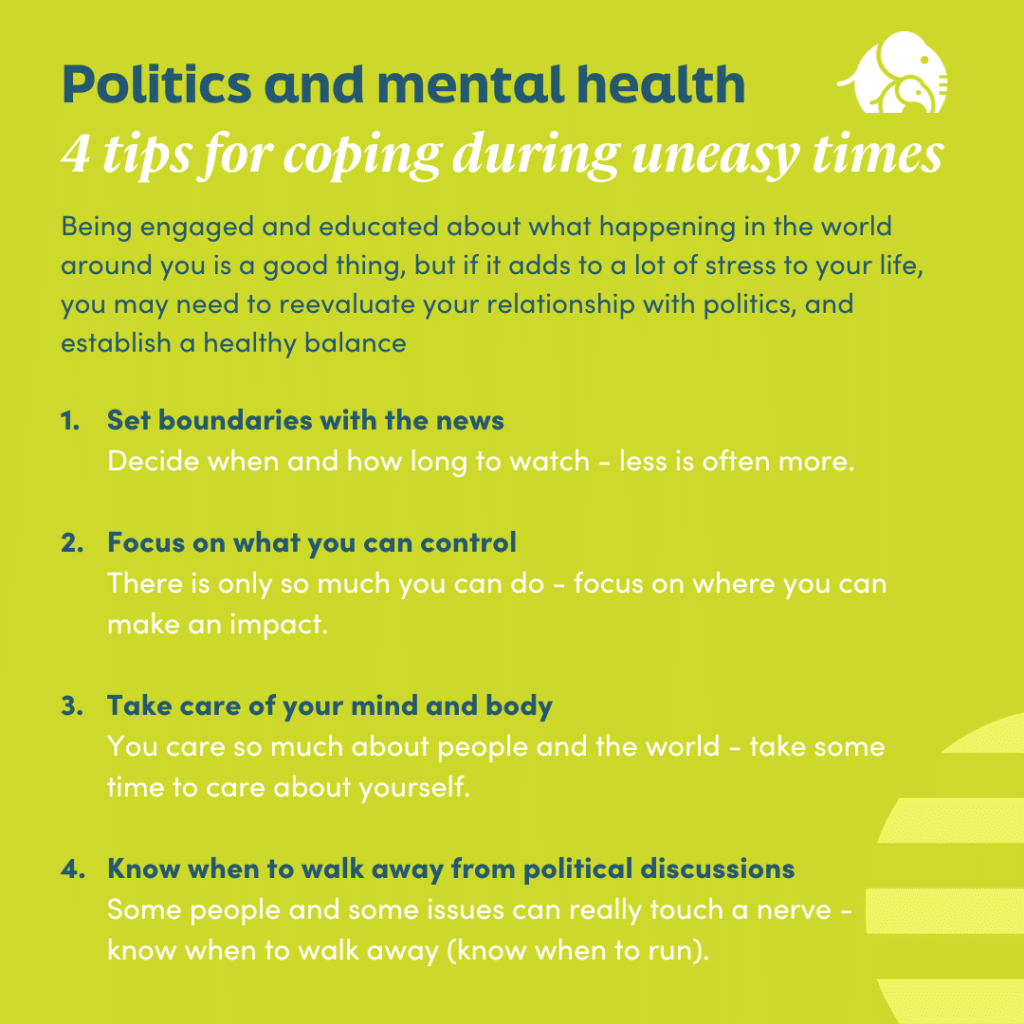Are you struggling to manage your mental health because of recent political events? Do you find yourself constantly checking social media for an update or spending hours online reading the news?
If you feel like the world is crashing around you every time you read a news article, you’re not alone. Many Americans are feeling the negative impacts of political divisiveness, acts of violence, and discrimination. And for many people, this type of political climate isn’t just something they read about. You may have witnessed upsetting events in your own community or experienced damaged relationships because of politics.
Being civically engaged and educated about what’s happening in the world around you is a good thing, but your mental health is important too. If you’re feeling overly anxious, are struggling to sleep at night, feel physically sick from stress, or are struggling with hopelessness or depression, you may need to reevaluate your relationship with politics and establish a healthy balance.
Need to talk with someone? Get matched with a therapist at Ellie Mental Health

1) Set Boundaries With the News
We live in a time when the news is always at our fingertips. Long gone are the days when you would have to wait for the morning paper to read about major events. Between social media, YouTube, podcasts, and your phone’s news app, you can consume politics 24/7.
Schedule Time To Check the News
While we’re not suggesting that you need to cut yourself off from the news entirely, it’s important you schedule digital breaks into your schedule. Set specific times during the day when you can catch up on the news, such as in the morning when you wake up, during your lunch break, or some time in the evening.
Practice Being Present-Minded
Just imagine all the extra time you’d have in your day if you only checked the news a couple of times a day or even just once a day. By setting healthy boundaries with politics (and the digital world) you free yourself to just live in the moment and focus on the present. This means having the time and focus to stay productive at work, have a thoughtful conversation with a friend, catch up with your mom, or dig into a good book.
2) Focus on What You Can Control
Not all stress is bad. It can keep you motivated, keep you out of danger, and push you to grow and stay healthy. However, feeling stressed or anxious all the time wreaks havoc on your mental and physical health. If you have chronic stress or an anxiety disorder, you may feel fatigued, worried, and hypervigilant all the time. You’ll likely get frequent headaches, have trouble sleeping at night, feel random aches and pains, have high blood pressure, get stomachaches, and notice unintended weight gain.
Often, the things that stress us out the most are those that are completely out of our control. Politics are a great example of this. While there are tons of great things you can do to make a difference in your community and be involved in politics, there are plenty of things you can’t control:
- You can’t control other people: Sure, you can influence, share your beliefs, and try to reason with other people. However, at the end of the day, you can’t force anyone to feel, say, or do anything. From the president to your parents, you aren’t in control or accountable for what anyone else chooses to do.
- You can’t control your privilege: Privilege (or lack of it) is a real thing and has a significant effect on how interact with others and the world around you. Where you were born, the color of your skin, your religion your health, your gender, your socioeconomic status, your sexual orientation, your age, your culture, your language — these are all factors that can be a privilege or a disadvantage.
- You can’t control nature: While you may wish it could be sunny and warm every day of the year, you have no control of the weather or natural disasters.
- You can’t control the past: Just like you can’t go back in time and stop yourself from saying that comment in high school that still makes you cringe, you can’t change horrific events that happened in the past.
However, you’re not just a victim to your circumstances because, fortunately, there are still plenty of things you can control. You can control your reactions, the way you treat others, who you choose to spend time with, how you spend your time, what you’re thankful for, how you take care of yourself, and how you perceive the world around you.
When you feel stressed about politics and the world around you, it helps to keep a running list of the things you can and can’t control. From here, you can be mindful about where you need to place boundaries to preserve your mental health and how you can act.
For example, while you can’t change the outcome of an election, you can choose to get involved in helping people in your community, vote during the next elections, join an advocacy group, or send letters to elected officials. And while you can’t force a friend to see things your way, you can choose to set boundaries in your relationship, not engage in political conversations, or even part ways.
3) Take Care of Your Mind and Body
Exercise, sleep, and a healthy diet provide the foundation you need to maintain or boost your mental health. If you need an instant mood boost, exercise is one of the most effective ways to reduce stress hormones, produce endorphins, and let go of tension in your body.
In times of political unrest, it’s easy to get so caught up in the news that you forget to carve time for self-care. And your daily responsibilities don’t go away when there’s chaos in the world — in most cases, you’ll still have work to do, a home to clean, a family to feed, and bills to pay.
When you start to feel stress, anger, sadness, hopelessness, or anxiety take over, remind yourself that your mental health matters and it’s okay to slow down. Whether you take twenty minutes a day to get outside and take a walk or end your night watching a funny TV show that helps you unwind, make time for fun. You can also find time to self-reflect and relax by journaling, meditating, doing yoga, or writing down what you’re thankful for.
4) Know When To Walk Away From Political Conversations
Political discussions can get heated, and not everyone is adept at keeping things civil. If a conversation at work, a family gathering, or in the classroom is making you uncomfortable, it’s okay to walk away. Sometimes, this might be as easy as slipping off to another room or disengaging from a group conversation. It might be more difficult to retreat during a one-on-one conversation, but it’s better to speak up and stop the discussion than to suffer through it.
Being mindful of the room when you talk politics and share your opinions can save you from jumping into a hurtful argument or experiencing painful repercussions. If the conversation becomes too personal or aggressive, it’s probably best for both parties to end the discussion. And there are certain times or environments where it’s best to stay away from divisive political topics, such as a work meeting.
When To Consider Therapy for Political Stress
Political stress can take a major toll on your mental health. When things go awry in the world, it’s hard not to be stressed. And if you feel at odds with your family and friends over political events or beliefs, you may feel isolated and alone in your anxiety.
At Ellie Mental Health, we’re firm believers that taking the time to better your mental health is the best way to improve your overall well-being and to be the best version of yourself. During times of uncertainty, panic, and overwhelming sadness, we’re here to listen and support you. No matter your background or political beliefs, our counseling team is full of compassionate therapists who can help.
Struggling to cope with political stress? Ellie is a safe place to heal and recharge. Get matched with a local provider today.


